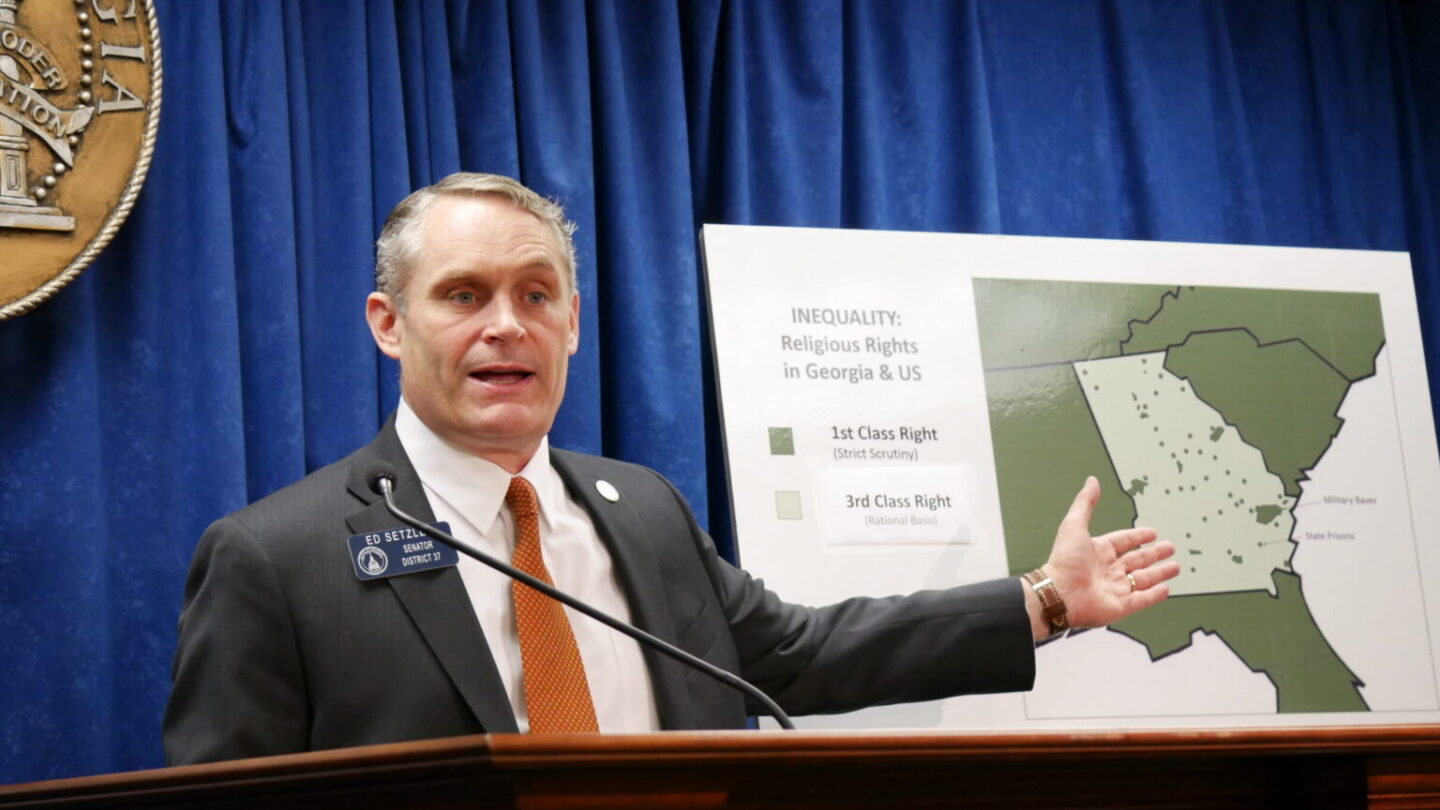State lawmaker’s revival of Georgia ‘religious freedom’ legislation sparks civil rights concerns

A new push for greater religious protections in Georgia has revived one of the most bitterly debated measures under the Gold Dome and renewed calls for a state-level nondiscrimination law.
State Sen. Ed Setzler, an Acworth Republican who sponsored the state’s 2019 abortion law, has filed a bill that would extend federal protections passed in 1993 to the state and local level, which he argues would protect religious Georgians from unfair government intrusion.
His bill is a pared down version of a bill that former Republican Gov. Nathan Deal vetoed in 2016 in the wake of the U.S. Supreme Court’s same-sex marriage ruling after major companies threatened to boycott Georgia.
“The intention is to do something that’s very basic, very conventional and should, as a matter of law, be noncontroversial – adopting the same protections that we have at the federal level and applying in the state and local government,” Setzler said at a press conference this week.
Setzler cited pandemic-era tensions between public health restrictions and the ability of people to attend church services as his motivation for resurrecting the debate over whether greater religious protections are needed in Georgia.
At least two dozen GOP senators have signed on to the bill. Gov. Brian Kemp has said in the past that he would sign a bill that mirrored the federal law, but it’s unclear whether he will go along with the timing. A spokesman for the governor’s office declined to comment Wednesday because it is pending legislation.
Setzler’s proposal was immediately met with concerns that it would justify discrimination, particularly against members of the LGBTQ community. It also remains to be seen how the business community – which was influential in blocking the 2016 law – will respond.
“While we can all agree that freedom of religion is a cornerstone of our beliefs, it is imperative that in an effort to protect religion that we do not create a license to discriminate,” said Jeff Graham, executive director of Georgia Equality, which advocates on behalf of the LGBTQ Georgians.
Georgia is one of only three states lacking a comprehensive state civil rights law, Graham said. So, he has offered a counter proposal: Pass statewide nondiscrimination protections for “all Georgians who fear discrimination because of who they are, who they love or how they pray.”
A nondiscrimination bill had not been filed in the Senate as of Wednesday, but pushing for those state-level protections has been a priority in the past, said Sen. Elena Parent, an Atlanta Democrat.
Parent said passing a religious freedom bill without a nondiscrimination statute would “open the door for a lot of types of discrimination on ‘religious grounds.’”
Setzler said he would need to see the specifics of an anti-discrimination bill to fully comment on it, but he voiced skepticism about the need. He pinned the failure of the 2016 measure on attempts at the time to specifically exempt certain people or situations.
“I think the flawed thinking that the balancing test of RFRA is not sufficient is this belief that it’s going to somehow bring about some perverse end,” he said Wednesday. “RFRA does not bring about any guaranteed outcome for any one party in the circumstance.”
When asked specifically if his proposal would shield a faith-based adoption agency that refused to work with same-sex couples, he said that would be up to the courts to sort out.
Local governments can also pass ordinances that he argued would provide enhanced nondiscrimination protections. So far, 13 cities have passed such ordinances, according to Georgia Equality. But opponents say Setzler’s bill could potentially negate those local protections.
“The challenge would be doing a statewide (RFRA law) without also doing a statewide nondiscrimination,” Parent said.
Setzler’s bill adds fuel to the partisan culture war battles that are beginning to crank back up during what had been an otherwise low-key legislative session.
Other Senate proposals would restrict doctors’ ability to provide gender-affirming care to transgender minors and block teachers and others from answering questions from a young person about the child’s sexual orientation or gender identity.
Cole Muzio, president of the conservative Frontline Policy Action, praised Setzler’s bill and said 34 states have passed similar measures over the years. His organization has advocated for proposals that critics have panned as anti-LGBTQ.
“Religious freedom is a human right that must be protected without further delay,” Muzio said in a statement.
At press conferences this week, Setzler brought visual aids to make the point that religion has only third-class rights when compared to other First Amendment guarantees, like freedom of speech.
He pointed to a Georgia case that reached the U.S. Supreme Court last year where a Georgia Gwinnett College student was allowed to proceed with a claim against the school on free speech but not religious grounds. The school had stopped him from preaching in a free-speech zone.
This story was provided by WABE content partner Georgia Recorder.








